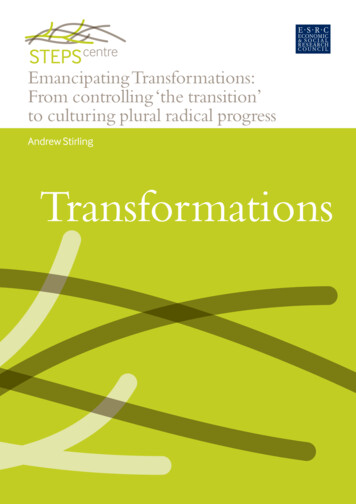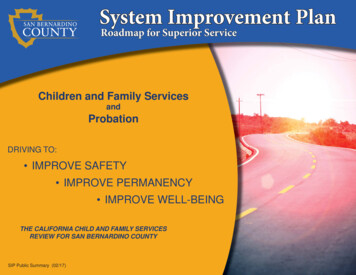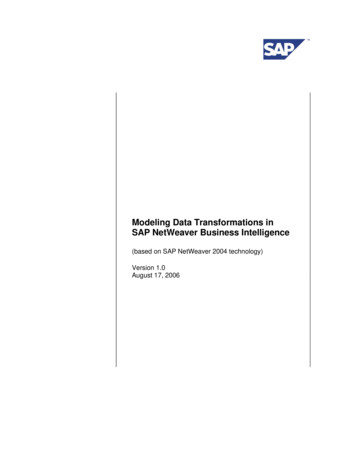
Transcription
Emancipating Transformations:From controlling ‘the transition’to culturing plural radical progressAndrew StirlingTransformations
Emancipating Transformations:From controlling ‘the transition’to culturing plural radical progressAbout the STEPS CentreCurrent global environmental policy reverberates with talk of anew “Anthropocene epoch” defined by “human domination”, inwhich a “perfect storm” of catastrophic threats is forcing “the greattransition” towards “planetary management”. Under growing“environmental authoritarianism”, democracy is increasingly seenas a “failure”, a “luxury”, or even “an enemy of nature”. If charge is tobe taken of the “control variables of the Earth”, democracy must be“put on hold”. So, knowledge itself is increasingly imprinted by theage-old preoccupations of incumbent power with rhetorics ofcontrol. It seems there is ‘no alternative’ but compliance – orirrational denial and existential doom.Yet there are alternative ways to understand the gravity of thesethreats – and act against them. It can be recognised, for instance,that democratic struggle is the principal means by whichknowledges of Sustainability were shaped in the first place. In thisview, concentrated power and fallacies of control are more aproblem than a solution. Here, history shows that the greatestongoing forms of radical progress (like freedom from slavery,colonialism, racism and patriarchy), owe more to unruly hopeinspired political struggle, than orderly technical transitions basedon fear-driven hierarchical control. Combining knowing and doing,a necessary step is the emancipation of transformation itself.Today’s world is experiencing rapid social, technological andenvironmental change, yet poverty and inequality are growing.Linking environmental sustainability with poverty reduction andsocial justice, and making science and technology work for thepoor, have become central challenges of our times. The STEPSCentre (Social, Technological and Environmental Pathways toSustainability) is an interdisciplinary global research and policyengagement hub that unites development studies with scienceand technology studies. We are developing a new approach tounderstanding and action on sustainability and developmentin an era of unprecedented dynamic change. Our pathwaysapproach aims to link new theory with practical solutions thatcreate better livelihoods, health and social justice for poor andmarginalised people. The STEPS Centre is based at the Instituteof Development Studies and SPRU Science and TechnologyPolicy Research at the University of Sussex, with partners inAfrica, Asia and Latin America. We are funded by the ESRC, theUK’s largest funding agency for research and training relatingto social and economic issues.www.steps-centre.org.Follow us on Twitter @stepscentreOther titles in this series include:About the AuthorAndy Stirling is co-director of the ESRC STEPS Centre and workson many other projects at SPRU – science and technology policyresearch at the University of Sussex. He’s served on advisory bodiesfor the EU on Energy Policy, Science in Society, CollaborativeResearch, Sustainability and Science Governance; for the UKgovernment on toxic substances, GM crops, public engagementand science advice; and working groups for the Royal Society,Nuffield Council and UN IHDP as well as boards for severalacademic journals and Greenpeace International. He’scurrently on the ESRC Research Committee.ApproachPathways to sustainability: an overview of theSTEPS Centre approach1. DynamicsDynamic Systems and the Challengeof Sustainability2. Governance Understanding Governance: pathwaysto sustainability3. DesignsEmpowering Designs: towards more progressiveappraisal of sustainability4. Agriculture Agri-Food System Dynamics: pathways tosustainability in an era of uncertainty5. HealthHealth in a Dynamic World6. WaterLiquid Dynamics: challenges for sustainabilityin water and sanitationFor more STEPS Centre publications visit:www.steps-centre.org/publicationsThis publication was funded by The Climate and DevelopmentKnowledge Network (www.cdkn.org)IDS Master LogoThis is one of a series of Working Papers from the STEPS Centrewww.steps-centre.org.ISBN: 978-1-78118-170-6 STEPS 2014
Emancipating Transformations:From controlling ‘the transition’ to culturing plural radicalprogressAndy StirlingSTEPS Working Paper 64
Correct citation: Stirling, A. (2014) Emancipating Transformations: From controlling ‘the transition’ toculturing plural radical progress, STEPS Working Paper 64, Brighton: STEPS CentreFirst published in 2014 STEPS 2014Some rights reserved – see copyright license for detailsISBN: 978-1-78118-170-6A longer and more fully-referenced version of a chapter for a forthcoming book edited by: I. Scoones,M. Leach, P. Newell (eds) ‘The Politics of Green Transformations’, Routledge, London, April 2014AcknowledgementsThis paper emerges especially from work for the ESRC STEPS Centre, Climate GeoengineeringGovernance and Technological Discontinuity projects. I have benefitted enormously from exchangeson various strands of this argument with Rob Bellamy, Rose Cairns, Yusuf Dirie, James Fairhead, JamilaHaider, Mike Hulme, Topsy Jewell, Melissa Leach, Erik Millstone, Pete Newell, Steve Rayner, IanScoones, Ed Steinmueller, Alfie Stirling, Freya Stirling, Jan-Peter Voss and Simon West.For further information please contact: STEPS Centre, University of Sussex, Brighton BN1 9RETel: 44 (0) 1273915673; Email: steps-centre@ids.ac.uk; web: www.steps-centre.orgSTEPS Centre publications are published under a Creative Commons Attribution – Non-Commercial –No Derivative Works 3.0 UK: England & Wales Licence egalcode)Attribution: You must attribute the work in the manner specified by the author or licensor.Non-commercial: You may not use this work for commercial purposes.No Derivative Works: You may not alter, transfer, or build on this work.Users are welcome to copy, distribute, display, translate or perform this work without writtenpermission subject to the conditions set out in the Creative Commons licence. For any reuse ordistribution, you must make clear to others the licence terms of this work. If you use the work, we askthat you reference the STEPS Centre website (www.steps-centre.org) and send a copy of the work ora link to its use online to the following address for our archive: STEPS Centre, University of Sussex,Brighton BN1 9RE, UK (steps-centre@ids.ac.uk).
ContentsAcronyms . iiAbstract . iii1. Introduction .12. Nexus, Necessity and Nudge .33. Anthropocene Planetary Domination .64: Democracy, Sustainability and Emancipation .105: From Transition to Transformation .136. Control, Care and ‘Knowing Doings’ .177. Conclusions . 22References . 24i
AcronymsBBCBritish Broadcasting CorporationCECCommission of the European CommunitiesDEFRADepartment for Environment, Food and Rural AffairsDIUSDepartment for Innovation, Universities and Skills,DTIDepartment for Trade and IndustryECFEuropean Climate FoundationERECEuropean Renewable Energy CouncilGEAGlobal Energy AssessmentIAASTDInternational Assessment of Agricultural Knowledge, Science and Technology forDevelopmentIAEAInternational Atomic Energy AuthorityICSUInternational Social Science CouncilIPCCIntergovernmental Panel on Climate ChangeSAC[DEFRA]Scientific Advisory CouncilSCSSStanding Committee for the Social SciencesUNDPUnited Nations Development ProgrammeUNEPUnited Nations Environment ProgrammeUNESCOUnited Nations Educational, Scientific and Cultural OrganizationWBCSDWorld Business Council for Sustainable DevelopmentWWFWorld Wide Fund for Natureii
AbstractCurrent global environmental policy reverberates with talk of a new 'Anthropocene epoch' defined by'human domination', in which a 'perfect storm' of catastrophic threats is forcing a singular 'greattransition' towards 'planetary management'. Under growing 'environmental authoritarianism',democracy is increasingly seen as a 'failure', a 'luxury', or even 'an enemy of nature'. If charge is to betaken of the 'control variables of the Earth', some say democracy must be 'put on hold'. One way ofseeing this trend, is that scientific and policy knowledges are becoming increasingly imprinted by thepreoccupations of incumbent power with rhetorics of control. Under this growing political mood, itseems there is ‘no alternative’ but compliance, or irrational denial and existential doom.Yet there are alternative ways to address the gravity of current ecological and social imperatives. Itcan be recognised, for instance, that democratic struggle is the principal means by which knowledgesand practices of Sustainability were shaped in the first place. In this view, concentrated power andfallacies of control are more problems than solutions. Here, history can show that the greatest ongoingforms of transformative progress (like release from colonialism, racism or patriarchy), owe more toplural knowledges and values and unruly hope-inspired agonistic contention, than to single orderlytechnical 'transitions' based on formally-integrated science or fear-driven structured control.Like other great progressive struggles of history, radical shifts in grassroots culture and anarchicallychoreographed flocking behaviours in nature, the most effective modes for radical change often lie inspontaneous collective bottom-up ‘culturings’ of knowing and doing. These do not depend on rigidlydisciplined ‘integrated science’ and monolithically-structured ‘planetary management’. Instead, realhope of radically progressive social transformation may lie more in the mutualities of caring, than inthe hierarchies of control. And among the greatest obstacles to this, are ideologies of technocratictransition. Perhaps the deepest necessity lies in emancipating 'transformation' itself?Keywords: democracy; Sustainability; transformation; transition; nexus; Anthropocene; planetaryboundaries; control; care;iii
1. IntroductionUnder any reasonable notion of ‘progress’, the most compelling imperatives lie in interlinkedchallenges of social justice and global environmental degradation (UNESCO and ISSC 2010; UNEP2012; UNDP 2013; UN 2013b; Griggs et al. 2012). But are the necessary social transformations toourgent, deep and pervasive to be reliably achieved by democratic means? Does manifest lack ofprogress indicate a 'failure of democracy' (Shearman and Smith 2007)? Is critical democratic discoursean obstructive or dispensable 'luxury' (Haan and Sierman 1996)? The iconically influentialenvironmentalist James Lovelock, for instance, suggests that 'it may be necessary to put democracyon hold for a while' (Hickman 2010). Indeed, the main European Commission news website has evenrecently queried whether democracy is actually an 'enemy of nature?' (Euractive 2010). If the term‘democracy’ is seen as a procedural euphemism, concealing ever more assertively concentrated globalpower and privilege, then perhaps it is (Crouch 2004; Ranciere 1999; Dean 2009; Swyngedouw 2009;Hewlett 2007). But maybe history teaches instead, that the only sure way to achieve real progressivesocial transformation is through the kinds of open, unruly political struggle that more properly deservethis name (Laclau and Mouffe 2001)? These are the questions on which this paper will focus.In short, the argument here will lead to a general heuristic distinction between two ideal-typical formsof radical social change (Stirling 2014a; Stirling 2011b). On one hand, are what might be called societal‘transitions’, often driven by technological innovation, managed under orderly control, by incumbentstructures according to tightly-disciplined frameworks for knowledge, towards a specific known(presumptively shared) end? Put simply for the sake of illustration, currently relevant examples of thiskind of change might include those most closely associated with prospective global transitions tonuclear power in energy production (Nuttall 2005), planetary geoengineering in climate changestrategies (Shepherd 2009; Fleming 2010; Ridgwell et al. 2012; Ruddiman 2005) or ‘sustainableintensification’ of food production using proprietary transgenic monocultures (Baulcombe et al. 2009).On the other hand, there are what might be called social ‘transformations’. These entail more plural,emergent and unruly political re-alignments, involving social and technological innovations driven bydiversely incommensurable knowledges, challenging incumbent structures and pursuing contending(even unknown) ends. Indeed, they may owe more to critical practice of other values, virtues or socialqualities than to utilitarian pursuit of ends at all (Neill et al. 2008; Hulme 2014; Grant 2011; Slote 1992;Slote 2007; Wong 2006). Stylised examples might include myriad changes in distributed energypractices, involving service innovations, radical eco-efficiencies, culture change and the massivelymore extensive harnessing of renewable resources (Jacobson and Delucchi 2009; Jacobson andDelucchi 2011; GEA 2012; EREC 2010; ECF 2010; PWC 2010; WWF 2011; IPCC 2012). Likewise thereare multiple innovations in the culture and practice of food production and use, involving ecologicalfarming, open source breeding, local supply chains, collective ownership and greater integration withother activities (Pretty 2005; Pretty 2002; Feenstra 1997; Altieri 2012; White and Stirling 2013).By reference to historic emancipatory struggles by oppressed classes, ethnicities, colonies, womenand sexualities (Zerzan 1999), the paper will argue that, contrary to much received wisdom, it isrepeatedly unruly, bottom-up ‘transformations’ rather than top-down structured ‘transitions’ (inthese senses), that typically achieve the most profound (sometimes rapid) radically progressive socialchanges (Curran 2007; Woshinsky 2008).So, apparent contention between different meanings and practices of Sustainability and ‘democracy’are not so much problems, but crucial parts of solutions (Przeworski et al. 1995; Dobson 2011; Dryzek2008; Leach 2012). Ecological viability and social justice are not competing ends to be traded off(Sagoff 2008), nor a monolithically integrated and depoliticised ‘nexus’ of technical imperatives (Leach1
2013; Pielke 2013; Stirling 2013). What makes them seem this way, is the expedient shaping ofknowledge (as well as action), by powerful interests (Leach et al. 2010). Just as concentrated powertends to favour controlling actions, so it also fosters knowledges that emphasise associated ‘fallaciesof control’. But what ecological and social justice challenges arguably actually require instead is lesssingular controlled ‘transitions’ driven by whatever are the incumbent structures in any given area,and more vibrant agonistic political mobilisations towards more open-ended and pervasive‘transformations’ (Stirling 2014a; Stirling 2011b). Far from democratic struggle being an 'enemy ofNature' (Euractive 2010) then, they are more likely each other’s deepest hopes.2
2. Nexus, Necessity and NudgeA starting point lies in a growing body of science warning that the world is faced with a 'perfect storm'of environmental threats (Poppy et al. 2014; Beddington 2009). Even if not as existential as sometimesimplied for the Earth as a whole or humanity in general, there are grave implications for manycommunities, populations, livelihoods and kinds of societies. The resulting 'nexus' of newvulnerabilities interacts with multiple prevailing forms of insecurity and injustice (Dodds and Bartram2014; Hoff 2011; Bizikova et al. 2013). As in these long-established but socially-remediable patterns,it is typically the least privileged people who remain the most vulnerable (Stirling 2014a).This new scientifically-framed ‘nexus’ of threats is currently attracting unprecedentedly intenseattention in global governance (UN 2013a; Hulme 2009; Jasanoff 2010). In many ways, this exceedsthe consideration afforded to older, more directly politically comprehensible vulnerabilities(Swyngedouw 2010), such as poverty, inequality, violence and exploitation. The result is unusual highlevel willingness to contemplate ostensibly 'radical transformation' in global practices, institutions andinfrastructures for provision of food, water and energy (ECF 2010). If the rhetorics are taken at facevalue, possibilities are opening up for potentially 'revolutionary' types and scales of change (BIS 2011;TSB 2012). Indeed, breathless talk of 'revolution' is especially pronounced when officially accrediteddiscourse describes the envisaged benefits of favoured technologies (Oyelaran-Oyeyinka and Rasiah2009; Kamal 2010; Rifkin 2012; Fukuyama 2002; Drexler et al. 1991; Adamsky 2010). Tellingly,however, such positive references to 'revolution' remain significantly less conspicuous when thesesame official discourses address the possibilities for more direct social, institutional or culturaltransformations. Beyond the field of technology, overt discussion of ‘revolutionary’ depths or scalesof social change seem nowadays to be viewed implicitly as highly impolite, or repudiated as if selfevidently naïve, utopian or malign ‘social engineering’ (May 2010; Mouffe 1992; Schäfer et al. 2014;Bauman 1998). It seems the disruptive connotations of 'revolution' are exciting only when aligned andcompliant with incumbent interests.Nonetheless, such is the intensity of growing discussion of this ‘nexus’ of imperatives for revolutionarytransformation, that serious leverage is potentially emerging for unintended collateral implications(Voss and Bornemann 2011). So, with the prospect of circumscribed direct forms of technological,organisational and discursive change, also arise possibilities for even more substantive and extensiveindirect political, institutional and cultural dislocations (Tenner 1999). Yet exactly how this potentialwider leverage plays out is open to modulation. The possible broader changes may act in progressiveways, challenging concentrations of privilege and power (Bauchspies et al. 2006). Or they may actmore regressively, to further entrench some of the driving incumbent patterns (Senker and Wyatt2000). Crucial here, is that it often remains rather nonspecific what exactly will actually constitute thewidely mooted 'great transitions' (Gallopín et al. 1997; NEF 2011; Naberhaus 2011), 'greentransformations' (Beck et al. 2013; Ekins et al. 2014) or 'transitions to Sustainability' (Smith and Raven2012; UNDP 2000; Hendriks and Grin 2007; Rauschmayer et al. 2013). Such ambiguity impairs tractionon the part of more marginal interests, thus weighing the dice against opportunities for moreprogressive struggle (Stirling 2014a).For instance, climate-driven pressures for a transformation towards radical 'soft energy paths'(Jacobson and Delucchi 2009; Jacobson and Delucchi 2011; GEA 2012; EREC 2010; ECF 2010; PWC2010; WWF 2011; IPCC 2012) (of a kind much proclaimed on the front covers of glossy reports), mayinstead be redirected more covertly towards a global transition to climate geoengineering (Shepherd2009; Fleming 2010; Ridgwell et al. 2012; Ruddiman 2005). More particular visions inspired by thepotential to harness distributed renewable resources (Jacobson and Delucchi 2009; Jacobson and3
Delucchi 2011; GEA 2012; EREC 2010; ECF 2010; PWC 2010; WWF 2011; IPCC 2012) in ways that alignwith the grain of local social and ecological contexts, may yield instead a 'low carbon transition' basedaround centralised, standardised, highly concentrated nuclear energy infrastructures (Nuttall 2005),with all their global security implications (Solomon and Marston 1986; Jungk 1985). Likewise,imperatives for transformations towards ecologically-sensitive forms of agriculture respecting thediverse knowledges of farmers as open source innovators in different settings (Pretty 2005; Pretty2002; Feenstra 1997; Altieri 2012), may instead be harnessed towards transitions to ‘sustainableintensification’ strategies promoting ‘monoculture’ transgenic crops, that maximise rents onintellectual property and global value chains (Baulcombe et al. 2009).Choices between contending institutional and infrastructural pathways like these, each variouslyclaimed to be 'green', are profoundly political (Leach et al. 2010). Yet these choices are typicallydiscussed in much existing ‘green transition’ literatures in rather vague and apolitical ways(Meadowcroft 2009). There is a shared concern that thinking in ‘silos’ (like water, energy or food) isproblematic. But it is unclear how similar dangers are to be avoided in inevitable new cross-cutting‘silos’. There are, after all, many different ways to structure ‘integration’. Too much ‘nexus’ discourseimplies that nonspecific aspirations to ‘integration’ somehow of themselves automatically transcendthe politics of framing (Stirling 2011b). In fact, integrative frameworks are typically no less sensitive tothe framing of their constituent elements, and often add many further contingencies of their own(Asselt and Rotmans 2002). In evading such issues, it is as if the key questions are simply aboutwhether to be ‘green’ or not, rather than about the radically different political understandings andactions that underpin these claims. It is in this depoliticised atmosphere, that it becomes possible topose the questions with which this paper began, over the relevance of democratic deliberation,contention and struggle, or whether 'democracy' might even be negative.This increasingly disempowering style of debate, is reinforced by a growing climate of 'environmentalauthoritarianism' (Beeson 2010). Despite their more generally progressive roles (Gautney 2010; Watts2007; Hess 2007; Jamison 2004; Steffek et al. 2008; Baker 2002), interventions by some prominentglobal NGOs can sometimes help set the mood, for instance by loudly asserting that there are 'onehundred months to save the planet' (Johnson and Simms 2008). If they are lucky, such polemics willbe forgotten before they are refuted (Hulme 2010). But they are widely repeated. The result is tofurther polarise politics simply around compliance or rejection of particular apocalyptic assertions.Little space is left for more nuanced scepticism or challenge over all-important details. Crucially, thisnegative emphasis on uncompromising technical fears, suppresses roles for democratic struggle overcontending positive hopes (Stirling 2013).Growing authoritarianism is also evident in the ways many influential institutions in environmentalgovernance are increasingly deprioritising previous hard-fought duties to be transparent, responsiveand accountable to citizens and public interests (Dobson 2011), in favour of more clandestinestrategies for the ‘nudging’ (Thaler and Sunstein 2008) of ‘users’ and ‘consumers’ (Brook Lyndhurst2009). Much government activity is devoted to developing ever more sophisticated covert means tocontrol (assert, educate, promote, implement) according to prior established ends, which seem everless clearly declared (Crouch 2004). Many businesses pursue increasingly elaborate practices of publicrelations ‘greenwash’ (Moloney 2000; Mickey 2003; Mackenzie 2007; Goldacre 2009; Rowell 2004;Doorley and Garcia 2007; Delmas and Burbano 2011; Rowell 1996). And, rather than actively andopenly prioritising the transforming of public interests and values, many large civil societyorganisations increasingly take a conservative view of established patterns, and treat these as a givenin their own communication strategies (Crompton 2010; Juniper 2012; Rose 2014).Risk is repeatedly addressed in terms of reputation (SAC 2007). Scepticism is regarded as a pathology(Stirling 2011a). Trust is interpreted disproportionately as a desirable virtue on the part of the4
powerless in favour of the powerful, rather than the other way around (Lewin and Vedung 1980; Greyand Willmott 2005). ‘Participation’ is undertaken more as a means to legitimation than legitimacy(Wynne 2006; Thorpe 2010; Hickey and Mohan 2004; Stirling 2008; Pellizzoni 2001). Andaccountability is further impaired by moves away from substantive ‘thick’ principles (Geertz 1973) like‘Sustainability’, ‘precaution’, ‘equity’, ‘justice’ and ‘liability’, with hard-fought established bodies ofpractice affording agency to wider interests (Leach et al. 2010). Instead, emphasis moves towardsmore amorphous, ‘thin’ notions like ‘responsibility’, where focus merely on asserted virtue can tendto romanticise (and so reinforce) the narrower agency of incumbents (DIUS 2007; Owen et al. 2012;Pellizzoni 2004; Owen et al. 2013). So, despite the impression given by apparently benign-soundingpolicy language around minimising ‘risk’, seeking ‘consensus’, fostering ‘trust’, enabling ‘participation’or promoting ‘responsibility’, collective capacities for open, progressive, plural, critical politicaldiscourse are increasingly undermined.Behind this, the roots of environmental challenges are increasingly located in the ‘behaviour’ ofordinary people, rather than in the structures and powerful interests that so actively constrain andcondition associated growing individualism, consumerism and materialism (Gallopín et al. 1997;Ransom and Baird 2009). The diagnosis increasingly moves away from explicitly political struggle,towards less visible psychological and communicative techniques for securing ‘behaviourmanagement’ (Furedi 2009). By emphasising the centrality of supposedly undifferentiated hard-wiredhuman nature, appreciation is further attenuated for critical argument and democratic struggle.Attention is drawn even further away from the potential for progressive political action to challengeparticular incumbent interests. In this ‘end of history’ illusion (Hodgson 1999; Fukuyama 1992), thecontrasting environmental and justice implications can be lost, even of relatively modest andproximate ‘varieties of capitalism’ (Hall and Siskice 2001). All too often, prospects for more diverse,creative and progressive forms of social and political transformation are conflated into a seeminglyamorphous, singular – depoliticised – 'way forward' (Treasury 2004; OECD 2005; Anon 2001; WBCSD2010; CEC 2013). Suffocated by the oppressive inevitability of 'no alternatives' rhetorics, they arethereby rendered quite simply, unimaginable (Crouch 2004; Kitschelt 2000).The implicit expectation often seems to be, that the powers doing all the nudging and controlling, willsomehow be kept benign simply by the manifest gravity of the professed environmental rationales.Yet, that the ecological threats are real and so much of the advocacy sincere, in no way diminishes thevulnerability to manipulation and diversion. The more assertive and apocalyptic the envisaged threat,the more seemingly desperately necessary the Faustian pact with power (Mulgan 2014; Norton 1991;Light and Katz 1996). And neither history nor current affairs suggest any guarantee that such bargainswill be delivered (Tilly 1978; Tilly 2007). Many historic examples can be found, where sincerelyprogressive efforts were made to tolerate temporary concentrations of power, towards ostensibleends of radical social transformation. Yet, time and again these actually reproduce the old incumbentstructures in new forms, often being even more entrenched (Amin et al. 1990; Arendt 1963; Skocpol1979). When power is given the opportunity, let alone the mandate, to invoke over-riding missions tocontrol (especially under a climate of fear), the results can be even less positive. The disarming effectsof superficial appearances can make the dangers especially acute where initial motivations appearmost altruistic.The world is a big and complex place. Care should therefore be taken with simplified, especiallypolarised, pictures. So, the ensuing discussion will seek to unfold these arguments in more detail. Butthere do seem grounds for more careful scrutiny of the current moves documented here towardsincreasingly technical and managerial forms of ‘nexus’, ‘nudge’ and environmental authoritarianism.Crucially, however, such scrutiny does not imply questioning of the underlying ecological and socialjustice imperatives. The greater the respect for the diagnosis of a need for transformation, the greaterthe responsibility to be sure about the prescriptions of authoritarianism.5
3. Anthropocene Planetary DominationThe authoritarian pressures documented above are also reflected in scientific discourse. Here, evengeological history is subject to reinterpretations emphasising the theme of control. For instance, theestablished epoch of the Holocene is a tiny 11,700 year span, oddly tacked on to the end of thepreceding 1.6 million year Pleistocene epoch (Douglas et al. 1996). Marking the point where Earthmoved out of the last of a long series of glaciations, there is little to distinguish the Holocene fromprevious Pleistocene interglacials, such as to justify a new scientifically-recognised epoch (Zala
a necessary step is the emancipation of transformation itself. About the Author Andy Stirling is co-director of the ESRC STEPS Centre and works on many other projects at SPRU – science and technology policy research at the University of Sussex. He’s served on advisory bodies for t










